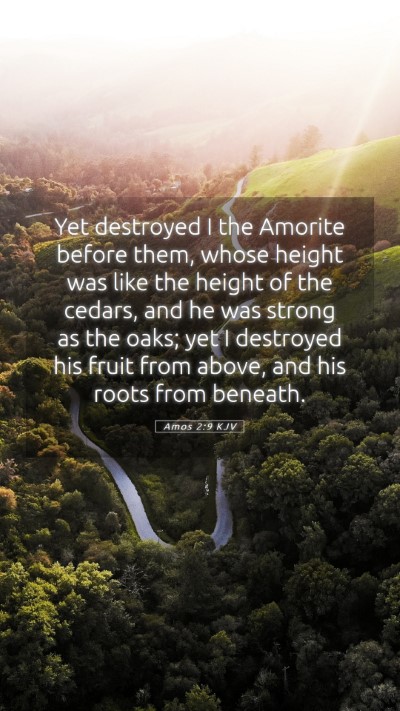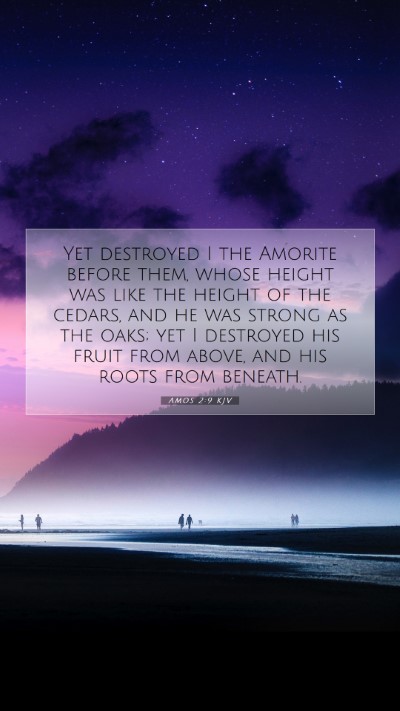Old Testament
Genesis Exodus Leviticus Numbers Deuteronomy Joshua Judges Ruth 1 Samuel 2 Samuel 1 Kings 2 Kings 1 Chronicles 2 Chronicles Ezra Nehemiah Esther Job Psalms Proverbs Ecclesiastes Song of Solomon Isaiah Jeremiah Lamentations Ezekiel Daniel Hosea Joel Amos Obadiah Jonah Micah Nahum Habakkuk Zephaniah Haggai Zechariah MalachiAmos 2:9 Meaning
What is the meaning of Amos 2:9?
Yet destroyed I the Amorite before them, whose height was like the height of the cedars, and he was strong as the oaks; yet I destroyed his fruit from above, and his roots from beneath.
Amos 2:9 Bible Verse Meaning
Understanding Amos 2:9
Amos 2:9 is a powerful verse within the context of the prophetic warnings delivered to Israel and its neighbors. The verse states:
"Yet it was I who destroyed the Amorite before them, whose height was like the height of the cedars, and he was as strong as the oaks; I destroyed his fruits above and his roots beneath."
Bible Verse Meaning
This verse illustrates God's sovereignty and His role in the deliverance of Israel. Through the lens of various public domain commentaries, we can gather a deeper understanding of its significance.
Key Insights from Commentaries
-
Matthew Henry:
Henry emphasizes God's might by comparing the Amorite's stature to that of mighty trees, indicating both strength and invincibility. The destruction of the Amorite serves as a metaphor for God's power to deliver and protect His people.
-
Albert Barnes:
Barnes interprets this destruction as a reminder to Israel of their chosen status. The reference to the Amorite's strength points to the overwhelming odds that God overcame on behalf of His people, showcasing His unwavering support and commitment.
-
Adam Clarke:
Clarke provides a historical context, suggesting that these statements serve to remind Israel of the land's history and God's providential care. The destruction of the Amorites is a testament to God's justice and the necessity for Israel to remain faithful.
Interpretation of the Verse
The interpretation of Amos 2:9 must be viewed through the themes of divine judgment and mercy. God reflects on His past actions against Israel’s enemies, illustrating His commitment to their welfare.
Historical Context
To fully grasp the meaning of this verse, it’s essential to understand the history of the Israelites and the Amorites. The destruction referred to in the verse alludes to events during the conquest of Canaan, where God ensured the Israelites were delivered from their enemies.
Theological Implications
Theological interpretations highlight God's justice and mercy—He judged the Amorites for their iniquities while simultaneously providing for His people. This duality underlines the importance of faithfulness and obedience to God’s will.
Application of the Verse
From a practical standpoint, Amos 2:9 encourages believers to perceive God’s protective hand in their lives. It illustrates that God actively intervenes in history and personal circumstances for the good of those who trust in Him.
Personal Reflection
When approaching this scripture, individuals are invited to reflect upon their own reliance on God. Just as He delivered Israel, believers are called to trust in His promises and His ability to overcome obstacles in their lives.
Cross References
To enhance the understanding of Amos 2:9, one may consider the following biblical cross-references:
- Deuteronomy 7:1-2: God's instruction regarding the conquest of Canaan.
- Joshua 12:8: A recounting of the kings defeated by Israel, including the Amorites.
- Psalm 136:17-21: A celebration of God’s enduring mercy in delivering His people from their foes.
Conclusion
In summary, Amos 2:9 serves as a profound reminder of God's strength, justice, and merciful intervention in the lives of His people. Through the insights gained from biblical commentaries, we can cultivate a richer understanding of scripture and apply its truths in our daily lives.
Final Thoughts
As you broaden your Bible study insights, consider how biblical exegesis can illuminate difficult passages. Each verse holds the potential for deeper understanding, and Amos 2:9 exemplifies the importance of contextual interpretation and application in our spiritual journey.


